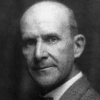When will the Miser’s Chest be full enough?
When will he cease his Bags to cram and stuff?
All Day he labours and all Night contrives,
Providing as if he’d an hundred Lives.
While endless Care cuts short the common Span:
So have I seen with Dropsy swoln, a Man,
Drink and drink more, and still unsatisfi’d,
Drink till Drink drown’d him, yet he thirsty dy’d.Benjamin Franklin (1706-1790) American statesman, scientist, philosopher, aphorist
Poor Richard (1735 ed.)
(Source)
Quotations about:
dissatisfaction
Note not all quotations have been tagged, so Search may find additional quotes on this topic.
If he is poor who is full of Desires, nothing can equal the Poverty of the Ambitious and the Covetous.
[S’il est vrai que l’on soit pauvre par toutes les choses que l’on désire, l’ambitieux et l’avare languissent dans une extrême pauvreté.]Jean de La Bruyère (1645-1696) French essayist, moralist
The Characters [Les Caractères], ch. 6 “Of Gifts of Fortune [Des Biens de Fortune],” § 49 (6.49) (1688) [Browne ed. (1752)]
(Source)
(Source (French)). Alternate translations:
If he is only poor who desires much, and is always in want; the Ambitious and the Covetous languish in extreme Poverty.
[Bullord ed. (1696)]
If a Man is poor, by all the things which he longs for, the Ambitious and Covetous languish in extreme Poverty.
[Curll ed. (1713)]
If a man be poor who wishes to have everything, then an ambitious and a miserly man languish in extreme poverty.
[tr. Van Laun (1885)]
If it is true that poverty consists in desiring a great many things, the ambitious man and the miser suffer from extreme poverty.
[tr. Stewart (1970)]
O the times! O the manners!
[O tempora, o mores!]
Marcus Tullius Cicero (106-43 BC) Roman orator, statesman, philosopher
Orationes in Catilinam [Catilinarian Orations], No. 1, § 1, cl. 2 (1.1.2) (63-11-08 BC) [tr. Mongan (1879)]
(Source)
(Source (Latin)). Alternate translations:
Oh what times! what a world do we live in!
[tr. Wase (1671)]
But O degenerate times!
[tr. Sydney (1795)]
Shame on the age and on its principles!
[tr. Yonge (1856)]
O the times! O the manners.
[tr. Underwood (1885)]
O times! O manners!
[tr. Dewey (1916)]
What a scandalous commentary on our age and its standards!
[tr. Grant (1960)]
O what times (we live in)! O what customs (we pursue)!
[IB Notes]
What times! What morals!
[Source]
“So far,” said I, “is this from filling me,
I famish more than if I’d held my tongue,
And in my mind pile up perplexity.”[“Io son d’esser contento più digiuno”,
diss’io, “che se mi fosse pria taciuto,
e più di dubbio ne la mente aduno.”]Dante Alighieri (1265-1321) Italian poet
The Divine Comedy [Divina Commedia], Book 2 “Purgatorio,” Canto 15, l. 58ff (15.58-60) (1314) [tr. Sayers (1955)]
(Source)
Dante complaining about the quality of some of Virgil's answers.
(Source (Italian)). Alternate translations:
"Oft, as I drink of that celestial rill,"
I cry'd, "I find my thirst increasing still;
Its copious draughts but more inflame my soul
In search of heav'nly truth."
[tr. Boyd (1802), st. 13]
“Now lack I satisfaction more,” said I,
“Than if thou hadst been silent at the first,
And doubt more gathers on my lab’ring thought."
[tr. Cary (1814)]
"Less satisfied am I than what I was,"
I said, "than if I still had held my peace;
And in my mind still more the doubts increase."
[tr. Bannerman (1850)]
"I am more hungering to be satisfied,"
I said, "than if I had before been silent,
And more of doubt within my mind I gather."
[tr. Longfellow (1867)]
"I am more fasting from being satisfied," said I, "than if I had before held my peace, and I unite more doubt in my mind."
[tr. Butler (1885)]
"Through being contented, I do hunger more
Than if thou first hadst silent been," I said,
"And in my mind I gather doubt galore."
[tr. Minchin (1885)]
“I am more hungering to be contented,” said I, “than if I had at first been silent, and more of doubt I assemble in my mind.
[tr. Norton (1892)]
"I am more fasting from being satisfied," said I, "than if I had kept silent at first, and more perplexity I amass in my mind."
[tr. Okey (1901)]
"I am more hungry for satisfaction" I said "than if I had been silent before and my mind is more filled with perplexity."
[tr. Sinclair (1939)]
"From being satisfied I fast not less
But more," said I, "than had I question spared,
And in my mind doubt doth the more increase."
[tr. Binyon (1943)]
"I am left hungier being thus fed,
and my mind is more in doubt being thus answered,
than if I had not asked at all," I said.
[tr. Ciardi (1961)]
"I am more hungering to be satisfied," I said, "than if I had at first been silent, and more of doubt do I assemble in my mind."
[tr. Singleton (1973)]
"I hunger more for satisfaction now,”
I said, “than when I held my tongue before,
and new perplexities come to my mind."
[tr. Musa (1981)]
"I am the more starved of satisfaction,"
I said, "than if I had said nothing just now,
And more doubt collects in my mind."
[tr. Sisson (1981)]
“I am more hungry now for satisfaction"
I said, "than if I'd held my tongue before;
I host a deeper doubt within my mind."
[tr. Mandelbaum (1982)]
“I am hungrier to be contented,” I said, “than if you had been silent earlier, and I am gathering more doubt in my mind."
[tr. Durling (2003)]
I said: "I am hungrier by being fed than if I had kept silent from the start, and I have added more confusion to my mind."
[tr. Kline (2002)]
"I hunger more for satisfaction now
than if," I said, "you'd not said anything.
I gather in my mind still greater doubt."
[tr. Kirkpatrick (2007)]
"I am more starved for answers," I said,
"'than if before I had kept silent,
since now my mind is filled with greater doubt."
[tr. Hollander/Hollander (2007)]
"My hunger for knowledge is now less satisfied,"
I said, "than if I had never asked the question,
And the more doubt collects in my troubled mind."
[tr. Raffel (2010)]
Dissatisfaction with the world in which we live and determination to realize one that shall be better, are the prevailing characteristics of the modern spirit.
G. Lowes Dickinson (1862-1932) British political scientist and philosopher [Goldsworthy "Goldie" Lowes Dickinson]
The Greek View of Life, ch. 5 “Conclusion” (1911)
(Source)
Envy iz sutch a constant companyun, that if we find no one abuv us to envy, we will envy thoze below us.
[Envy is such a constant companion, that if we find no one above us to envy, we will envy those below us.]
Josh Billings (1818-1885) American humorist, aphorist [pseud. of Henry Wheeler Shaw]
Everybody’s Friend, Or; Josh Billing’s Encyclopedia and Proverbial Philosophy of Wit and Humor, “Plum Pits” (1874)
(Source)
If all men were rich, all men would be poor.
Mark Twain (1835-1910) American writer [pseud. of Samuel Clemens]
Mark Twain’s Noteook (1935 ed) [ed. Paine]
(Source)
Clarity and perseverance are difficult in American society because the basis of capitalism is greed and dissatisfaction.
Natalie Goldberg (b. 1948) American author, teacher, speaker
Wild Mind: Living the Writer’s Life, ch. 42 (1990)
(Source)
Ghosts seem harder to please than we are; it is as though they haunted for haunting’s sake — much as we relive, brood, and smoulder over our pasts.
Elizabeth Bowen (1899-1973) Irish author
The Second Ghost Book, Preface (1952) [ed. C. Asquith]
(Source)
The mass of men live lives of quiet exasperation.
Is there anything in life so disenchanting as attainment?
Robert Louis Stevenson (1850-1894) Scottish essayist, novelist, poet
“The Adventure of the Hansom Cabs” (1878)
(Source)
Here’s a man who’s wangled millions;
Yet the parasite’s not done.
Fortune gives too much to many,
Yet, strange to say, enough to none.[Habet Africanus miliens, tamen captat.
Fortuna multis dat nimis, satis nulli.]Martial (AD c.39-c.103) Spanish Roman poet, satirist, epigrammatist [Marcus Valerius Martialis]
Epigrams [Epigrammata], Book 12, epigram 10 (12.10) (AD 101) [tr. Marcellino (1968)]
(Source)
"On Africanus." Africanus is identified in some sources as a captator, one who sucked up to a childless millionaire in order to inherit part or all of their estate.
(Source (Latin)). Alternate translations:
As riche as Cresus Afric is:
for more yet hunts the chuffe:
To muche to many, fortune gives,
and yet to none inuffe.
[tr. Kendall (1577)]
Fortune, some say, doth give too much to many:
And yet she never gave enough to any.
[tr. Harington (fl. c. 1600); Book 4, ep. 56; overall ep. 310]
African has a thousand pounds in store,
Yet he desires, and hunts, and rakes for more:
Fortune hath overmuch bestow'd on some;
But plenary content doth give to none.
[tr. Fletcher (1656)]
He fawns for more, though he his thousands touch:
Fortune gives one enough, but some too much.
[tr. Hay (1755)]
Millions has Africa; yet grasps at more:
Too much have many, none sufficient store.
[tr. Elphinston (1782), 12.65]
Africanus possesses a hundred thousand sesterces, but is always striving by servility to acquire more. Fortune gives too much to many, enough to none.
[tr. Amos (1858), ch. 3, ep. 92, "Sufficient Fortune"]
Africanus possesses a hundred thousand sesterces, and yet covets more. Fortune gives too much to many, enough to none.
[tr. Bohn's Classical (1859)]
Fortune to many gives too much, enough to none.
[ed. Harbottle (1897)]
African us possesses a hundred millions, yet he angles for more. Fortune to many gives too much, enough to none.
[tr. Ker (1919)]
Although he is a millionaire,
He courts the rich who lack an heir;
Fortune gives much to many a one,
But just enough she grants to none.
[tr. Pott & Wright (1921)]
Africanus has a hundred million, but still he fishes for legacies. Fortune gives too much to many, to none enough.
[tr. Shackleton Bailey (1993)]
Africanus is a tireless legacy-hunter
though he's a wealthy man.
Fortune gives too much to many,
enough to none
[tr. Kennelly (2008)]
Although worth millions, Africanus hunts a legacy.
To many Fortune gives too much, enough to nobody.
[tr. McLean (2014)]
Africanus has a hundred million, and still he's hunting legacies. Fortune gives too much to many, but "enough" to none.
[tr. Nisbet (2015)]
Yet there is still this difference between man and all other animals — he is the only animal whose desires increase as they are fed; the only animal that is never satisfied.
You’ve got to rattle your cage door. You’ve got to let them know that you’re in there, and that you want out. Make noise. Cause trouble. You may not win right away, but you’ll sure have a lot more fun.
Florynce "Flo" Kennedy (1916-2000) American lawyer, feminist, civil rights activist
(Attributed)
(Source)
Quoted in Gloria Steinem, "The Verbal Karate of Florynce R. Kennedy, Esq.," Ms. (Mar 1973).
Ambition has its disappointments to sour us, but never the good fortune to satisfy us. Its appetite grows keener by indulgence and all we can gratify it with at present serves but the more to inflame its insatiable desires.
Benjamin Franklin (1706-1790) American statesman, scientist, philosopher, aphorist
“On True Happiness,” The Pennsylvania Gazette (20 Nov 1735)
(Source)
The happiness which is lacking makes one think even the happiness one has unbearable.
Joseph Roux (1834-1886) French Catholic priest
Meditations of a Parish Priest: Thoughts, Part 5, #37 (1886)
(Source)
“The trouble with this country is,” observed Herndon, “that there’re too many people going about saying: ‘The trouble with this country is –‘”
Most of us have achieved levels of affluence and comfort un-thought of two generations ago. We’ve never had it so good, most of us. Nor have we ever complained so bitterly about our problems. The closed circle of materialism is clear to us now — aspirations become wants, wants become needs, and self-gratification becomes a bottomless pit. All around us we have seen success in the world’s terms become ultimate and desperate failure.
Human life must be some kind of mistake. The truth of this will be sufficiently obvious if we only remember that man is a compound of needs and necessities hard to satisfy; and that even when they are satisfied, all he obtains is a state of painlessness, where nothing remains to him but abandonment to boredom. This is direct proof that existence has no real value in itself; for what is boredom but the feeling of the emptiness of life? If life — the craving for which is the very essence of our being — were possessed of any positive intrinsic value, there would be no such thing as boredom at all: mere existence would satisfy us in itself, and we should want for nothing. But as it is, we take no delight in existence except when we are struggling for something; and then distance and difficulties to be overcome make our goal look as though it would satisfy us — an illusion which vanishes when we reach it; or else when we are occupied with some purely intellectual interest — when in reality we have stepped forth from life to look upon it from the outside, much after the manner of spectators at a play. And even sensual pleasure itself means nothing but a struggle and aspiration, ceasing the moment its aim is attained. Whenever we are not occupied in one of these ways, but cast upon existence itself, its vain and worthless nature is brought home to us; and this is what we mean by boredom. The hankering after what is strange and uncommon — an innate and ineradicable tendency of human nature — shows how glad we are at any interruption of that natural course of affairs which is so very tedious.
[Daß das menschliche Daseyn eine Art Verirrung seyn müsse, geht zur Genüge aus der einfachen Bemerkung hervor, daß der Mensch ein Konkrement von Bedürfnissen ist, deren schwer zu erlangende Befriedigung ihm doch nichts gewährt, als einen schmerzlosen Zustand, in welchem er nur noch der Langenweile Preis gegeben ist, welche dann geradezu beweist, daß das Daseyn an sich selbst keinen Werth hat: denn sie ist eben nur die Empfindung der Leerheit desselben. Wenn nämlich das Leben, in dem Verlangen nach welchem unser Wesen und Daseyn besteht, einen positiven Werth und realen Gehalt in sich selbst hätte; so könnte es gar keine Langeweile geben: sondern das bloße Daseyn, an sich selbst, müßte uns erfüllen und befriedigen. Nun aber werden wir unsers Daseyns nicht anders froh, als entweder im Streben, wo die Ferne und die Hindernisse das Ziel als befriedigend uns vorspiegeln, welche Illusion nach der Erreichung verschwindet; oder aber in einer rein intellektuellen Beschäftigung, in welcher wir jedoch eigentlich aus dem Leben heraustreten, um es von außen zu betrachten, gleich Zuschauern in den Logen. Sogar der Sinnengenuß selbst besteht in einem fortwährenden Streben und hört auf, sobald sein Ziel erreicht ist. So oft wir nun nicht in einem jener beiden Fälle begriffen, sondern auf das Daseyn selbst zurückgewiesen sind, werden wir von der Gehaltlosigkeit und Nichtigkeit desselben überführt, und Das ist die Langeweile. Sogar das uns inwohnende und unvertilgbare, begierige Haschen nach dem Wunderbaren zeigt an, wie gern wir die so langweilige, natürliche Ordnung des Verlaufs der Dinge unterbrochen sähen.]
Arthur Schopenhauer (1788-1860) German philosopher
Parerga and Paralipomena, Vol. 2, ch. 11 “The Vanity of Existence [Der Nichtigkeit des Daseins],” § 146 (1851)
(Source)
(Source (German)). Alternate translation:
That human life must be a kind of mistake is sufficiently clear from the fact that man is a compound of needs, which are difficult to satisfy; moreover, if they are satisfied, all he is granted is a state of painlessness, in which he can only give himself up to boredom. This is a precise proof that existence in itself has no value, since boredom is merely the feeling of the emptiness of life. If, for instance, life, the longing for which constitutes our very being, had in itself any positive and real value, boredom could not exist; mere existence in itself would supply us with everything, and therefore satisfy us. But our existence would not be a joyous thing unless we were striving after something; distance and obstacles to be overcome then represent our aim as something that would satisfy us -- an illusion which vanishes when our aim has been attained; or when we are engaged in something that is of a purely intellectual nature, when, in reality, we have retired from the world, so that we may observe it from the outside, like spectators at a theatre. Even sensual pleasure itself is nothing but a continual striving, which ceases directly its aim is attained. As soon as we are not engaged in one of these two ways, but thrown back on existence itself, we are convinced of the emptiness and worthlessness of it; and this it is we call boredom. That innate and ineradicable craving for what is out of the common proves how glad we are to have the natural and tedious course of things interrupted.
[tr. Dircks]
That human existence must be some kind of error, is sufficiently clear from the simple observation that man is a concretion of needs and wants. Their satisfaction is hard to attain and yet affords him nothing but a painless state in which he is still abandoned to boredom. This, then, is a positive proof that, in itself, existence has no value; for boredom is just that feeling of its emptiness. Thus if life, in the craving for which our very essence and existence consist, had a positive value and in itself a real intrinsic worth, there could not possibly be any boredom. On the contrary, mere existence in itself would necessarily fill our hearts and satisfy us. Now we take no delight in our existence except in striving for something when the distance and obstacles make us think that the goal will be satisfactory, an illusion that vanishes when it is reached; or else in a purely intellectual occupation where we really step out of life in order to contemplate it from without, like spectators in the boxes. Even sensual pleasure itself consists in a constant striving and ceases as soon as its goal is attained. Now whenever we are not striving for something or are not intellectually occupied, but are thrown back on existence itself, its worthlessness and vanity are brought home to us; and this is what is meant by boredom. Even our inherent and ineradicable tendency to run after what is strange and extraordinary shows how glad we are to see an interruption in the natural course of things which is so tedious.
[tr. Payne (1974)]
Want is a growing giant whom the coat of Have was never large enough to cover.
Ralph Waldo Emerson (1803-1882) American essayist, lecturer, poet
“Wealth,” The Conduct of Life, ch. 3 (1860)
(Source)
Be always displeased at what thou art, if thou desirest to attain to what thou art not.
I hate, I despise your festivals, and I take no delight in your solemn assemblies. Even though you offer me your burnt offerings and grain offerings, I will not accept them, and the offerings of well-being of your fatted animals I will not look upon. Take away from me the noise of your songs; I will not listen to the melody of your harps. But let justice roll down like water and righteousness like an ever-flowing stream.
The Bible (The Old Testament) (14th - 2nd C BC) Judeo-Christian sacred scripture [Tanakh, Hebrew Bible], incl. the Apocrypha (Deuterocanonicals)
Amos 5:21-24 [NRSV (1989 ed.)]
(Source)
Alternate translations:
I hate, I despise your feast days, and I will not smell in your solemn assemblies. Though ye offer me burnt offerings and your meat offerings, I will not accept them: neither will I regard the peace offerings of your fat beasts. Take thou away from me the noise of thy songs; for I will not hear the melody of thy viols. 24 But let judgment run down as waters, and righteousness as a mighty stream.
[KJV (1611)]
I hate and despise your feasts, I take no pleasure in your solemn festivals. When you offer me holocausts, I reject your oblations, and refuse to look at your sacrifices of fattened cattle. Let me have no more of the din of your chanting, no more of your strumming on harps. But let justice flow like water, and integrity like an unfailing stream.
[JB (1966)]
The Lord says, “I hate your religious festivals; I cannot stand them! When you bring me burnt offerings and grain offerings, I will not accept them; I will not accept the animals you have fattened to bring me as offerings. Stop your noisy songs; I do not want to listen to your harps. Instead, let justice flow like a stream, and righteousness like a river that never goes dry."
[GNT (1976)]
I loathe, I spurn your festivals,
I am not appeased by your solemn assemblies.
If you offer Me burnt offerings -- or your grain offerings --
I will not accept them;
I will pay no heed
To your gifts of fatlings.
Spare Me the sound of your hymns,
And let Me not hear the music of your lutes.
But let justice well up like water,
Righteousness like an unfailing stream.
[RJPS (2006)]
I hate, I despise your religious festivals; your assemblies are a stench to me. Even though you bring me burnt offerings and grain offerings, I will not accept them. Though you bring choice fellowship offerings, I will have no regard for them. Away with the noise of your songs! I will not listen to the music of your harps. But let justice roll on like a river, righteousness like a never-failing stream!
[NIV (2011 ed.)]
We are born crying, live complaining, and die disappointed.
Thomas Fuller (1654-1734) English physician, preacher, aphorist, writer
Gnomologia: Adages and Proverbs, #5427 (1732)
(Source)
If it had not been for the discontent of a few fellows who have not been satisfied with their condition you would still be living in caves. You never would have emerged from the jungle. Intelligent discontent is the mainspring of civilization. Progress is born of agitation. It is agitation or stagnation.
Eugene V. Debs (1855-1926) American union leader, activist, socialist, politician
“The Issue,” Speech, Girard, Kansas (23 May 1908)
(Source)


























